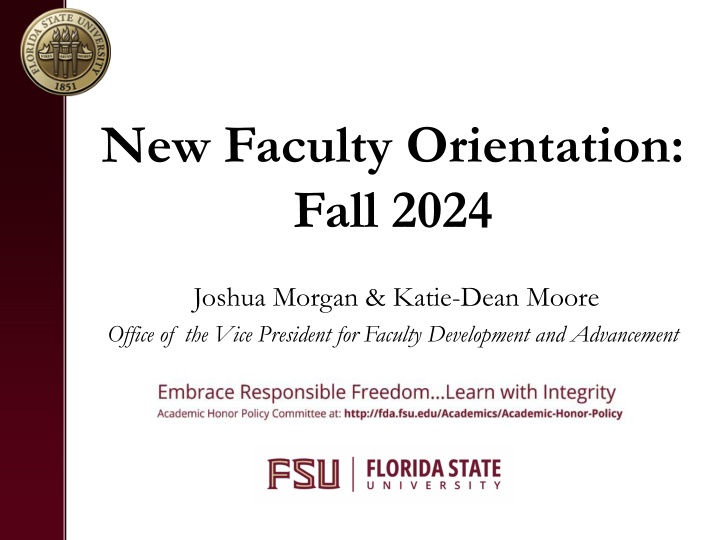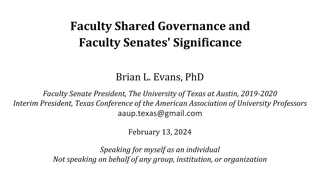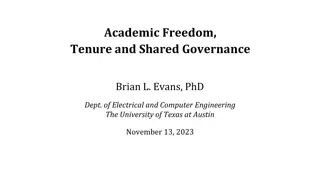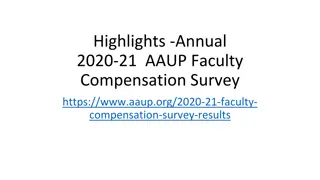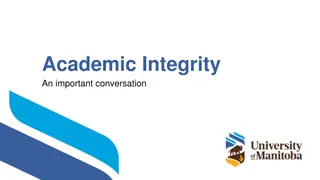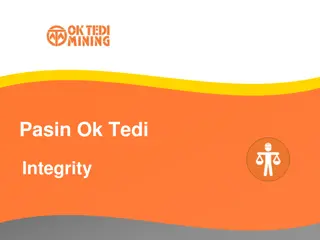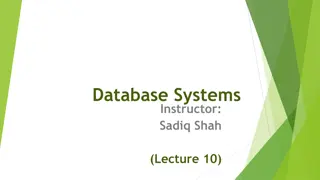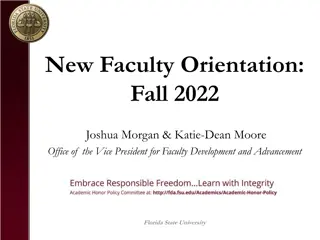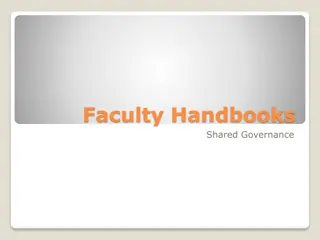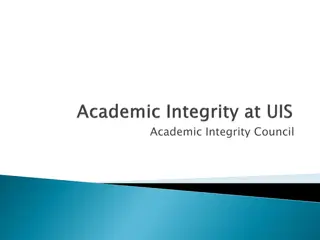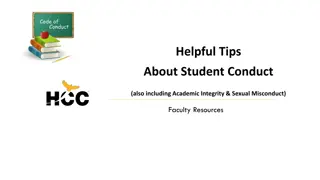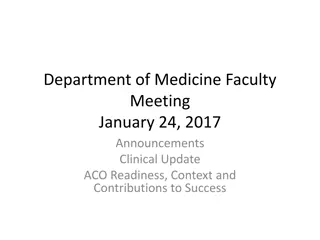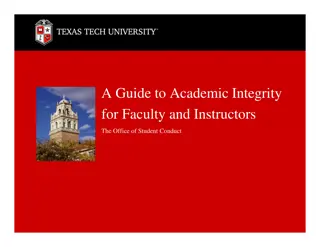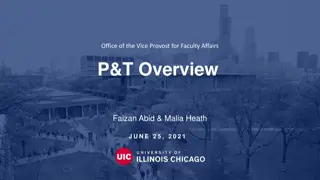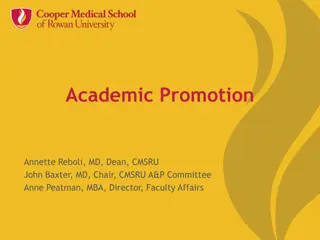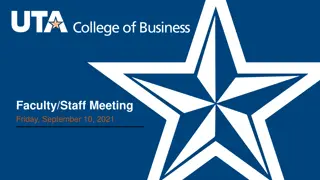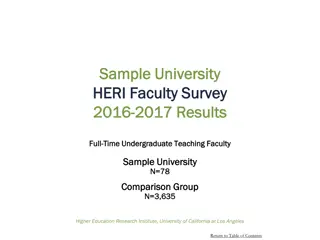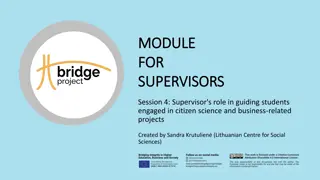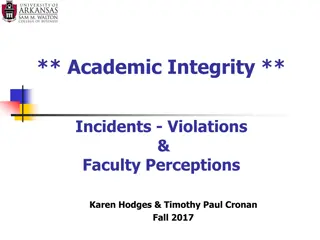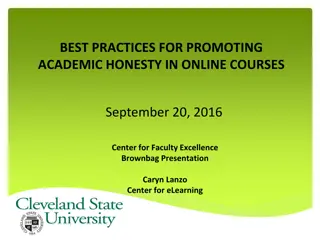Enhancing Academic Integrity: Best Practices for Faculty Engagement
Explore how the Office of the Vice President for Faculty Development and Advancement at FSU supports academic integrity through a non-adversarial process. Learn about resolution options, consulting with instructors, enforcing policy, and conducting allegation discussions with students to foster accountability and integrity on campus.
Download Presentation

Please find below an Image/Link to download the presentation.
The content on the website is provided AS IS for your information and personal use only. It may not be sold, licensed, or shared on other websites without obtaining consent from the author.If you encounter any issues during the download, it is possible that the publisher has removed the file from their server.
You are allowed to download the files provided on this website for personal or commercial use, subject to the condition that they are used lawfully. All files are the property of their respective owners.
The content on the website is provided AS IS for your information and personal use only. It may not be sold, licensed, or shared on other websites without obtaining consent from the author.
E N D
Presentation Transcript
New Faculty Orientation: Fall 2024 Joshua Morgan & Katie-Dean Moore Office of the Vice President for Faculty Development and Advancement
Academic Integrity at FSU Educational & non adversarial process FDA helps to resolve allegations/misconduct Due process is essential Option A: Informal, educational resolution Option A may not involve a misconduct grade penalty! Option B: Formal escalation to FDA Option B may involve a grade penalty Still be educational & consider remediation resources Students may not drop/withdraw from/change the grading basis of course when misconduct has been alleged
How FDA Helps Consulting with instructors Checking for prior violations Prompting students to respond to allegations Troubleshooting online/digital exam breaches Enforcing policy & sanction accountability
Academic Honor Policy Faculty are responsible for prioritizing integrity Setting behavioral expectations Designing/revising courses to prioritize integrity Consulting about distance learning best practices Auditing assessments for efficacy & any breaches Implementing the policy consistently (not arbitrarily) Location of all documents, forms, & guides: https://fda.fsu.edu/academic-resources/academic-integrity- and-grievances/academic-honor-policy
Allegation Discussions with Students: Best Practices Discuss via email or in-person with detailed notes emailed quickly after the conversation Share relevant evidence with students Allow 5 class days to choose a resolution Enter Incomplete or I final grades when cases are unresolved between semesters; this is important for due process! Graduate assistants: Must consult instructors of record regarding incident management
Resolving Allegations Remember: Be educational & non adversarial as you emphasize accountability Student Instructor Resolution (S.I.R.) Student admits to misconduct; accepts the instructor s sanctions AHP Hearing Student denies misconduct or has a prior violation; instructor presents the case before a students & faculty panel Disputing the Sanction (D.T.S.) Student admits to misconduct but does not accept the proposed sanction; OFDA reviews the case & issues a final decision Administrative Case Resolution (A.C.R.) Student s case is straightforward (based on the evidence) and/or the student admits to misconduct yet they are ineligible for both SIR & DTS options; ACR expedites the process in lieu of a hearing Important Note: AHPhearings are also used when alleged behavior is egregious (egregiousness is defined by the policy, not by instructors individual perceptions)
Refers to Charge #1: Plagiarism, not the number of violations! Notice the contextual detail & prevention methods that support the allegations Redemption opportunities & educational sanctions may be offered Early expungement is only available to students with a single offense!
Prevention: Course Design Week 1: Mandatory Syllabus/Integrity Quiz Set expectations early Encourage accountability Convey Relevance Regularly Why is this important? How does this relate personally? What current events are teachable moments? Provide Frequent, Low Stakes Assessments Foster mastery & self efficacy Reduce performance anxiety Enhance capacity to appreciate the subject Administer Brief Exam Access Ideally, only 1-2 days of exam access Limit their exam time within reason Unless otherwise accommodated Grade Major & Minor Milestones (i.e., Scaffold) Review annotated bibliographies Consult about topic narrowing & thesis writing Reward polished drafts that show growth Diversify Assessment Formats & Types Allow open note/open book exams Create select all that apply questions Partial credit for partial correctness Use audio visual software (e.g., Zoom) to facilitate oral exams, quizzes, & interviews Revise assessments to gauge procedural knowledge for job scenarios Implement Distance Learning Best Practices Randomize question bank items & question order Present one exam question at a time Restrict post exam viewing of correct answers
Prevention: Dialogue Encourage Proactive Communication e.g., timely notice regarding illness, environmental concerns, accommodations, grief/loss, mental health considerations, etc. Prepare Students to Verify Claims Set expectations about doctors notes and the stipulations for excused absences in your 1st day lectures, syllabi, & Canvas announcements Email FDA to Facilitate an AHP Presentation Especially if you need an alternate lecture or if class was going to be cancelled for some reason Be Approachable, Empathetic, & Professional Students often struggle to exercise their new freedoms responsibly Remember: Educational sanctions address ethical decision making; harsh grade penalties alone do not always teach the intended lessons
Resources The Academic Honor Policy Webpage FSU Libraries Citation Guides FSU Libraries Technology Rentals FSU English Dept. Plagiarism Activities iThenticate
Questions? Email jlmorgan@fsu.edu & kd.moore@fsu.edu Thank you!
